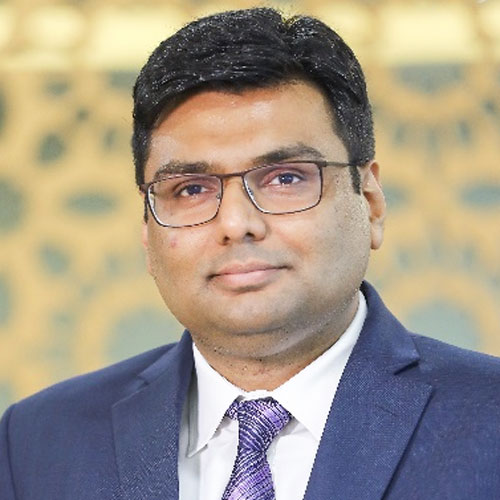Mr. Anurag Mittal
Head - Fixed Income, UTI Asset Management Company Limited
Anurag Mittal is the Head - Fixed Income at UTI Asset Management Company Ltd. He is a Chartered Accountant affiliated with Institute of Chartered Accountant of India and holds a degree in Master of Science from University of London. He previously held the office of Senior Fund Manager at IDFC Asset Management Company Private Limited and managed key IDFC debt mutual fund schemes. Prior to this, he was associated with HDFC Asset Management Company Limited as Senior Manager - Investments and Axis Asset Management Company Limited as Fund Manager - Investments, responsible for Fund Management, Dealing and Research.
Q1. With growing speculation about a potential rate cut by the US Fed, which might prompt a rate cut by the RBI in India, what trajectory do you anticipate for interest rates? How could this affect your funds?
We expect 50-75 bps rate cut by the RBI in the next 6-12 months primarily due to easing food inflation and moderating economic growth. Given the expectations of a shallow rate cut cycle, we expect short to medium duration segments (3-7 years) of the yield curve to outperform in the medium term. We are accordingly positioned in our actively managed funds.
Q2. What will be the impact of geopolitical actions like war in Ukraine and Russia, Bank of Japan's interest rate hike and weaker U.S. labor market data on India's debt market?
Typically, geo-political tensions or volatile currency movements due to central bank actions (for example Bank of Japan’s) are negative for emerging markets. However, India’s favorable current account dynamics due to its improving service exports, high foreign investment flows & the robust FX reserves have helped maintain currency and bond market stability.
The Federal reserve in its last FOMC meeting has already stated that they may look to cut rates as balance of risks has shifted towards growth from inflation and they do not welcome “further cooling in labour market conditions”. Hence, we expect that the weak labour market in the US could propel the Federal Reserve to start its rate cutting cycle by 150-200 bps at a minimum in the next 12 months. While RBI may initially remain on hold given India’s still high growth & historically volatile inflation, we expect them to initiate the rate cutting cycle once they have greater confidence on the durability of disinflation.
Q3. How do you handle credit and interest rate risk within the fund?
At UTI Mutual Fund, we have leveraged our long-term track record of managing fixed income funds, our research capabilities & risk management tools into developing our in house curated fixed income investment framework – “GIMS” which stands for Gate, Investments, Monitoring & Surveillance. The objective of the GIMS framework is to select the most suitable companies for our investment universe, create a framework for portfolio strategy with well-defined risk limits and ensure consistent monitoring of the portfolios.
We strongly believe in active duration management across our funds to optimize our view on interest rates. What is really important for us is to ensure a strong team to safeguard quality views. As Michael Jordan once said, “talent wins games, but teamwork wins championships”. Our team is not only highly experienced but extremely stable. All our fund managers have an experience of 15+ years in UTI.
Q4. What kind of growth have you seen in the popularity of debt funds over the last 4-5 years? What is fueling this trend?
Fixed income funds (excluding liquid/overnight) AUM has grown from Rs. 5.1 trillion in FY19 to Rs. 9.71 trillion in FY24 registering a healthy CAGR of 13.7%. However, the product mix is changing incrementally after the changes in taxation for fixed income mutual funds. While duration and target maturity funds were contributing meaningfully to flows till FY23, it is money management products which are driving flows in recent times. While investors are adjusting to the new tax regime, we believe over the longer term, investors should start re-allocating to fixed income funds to realise the advantage of a diversified, transparent and relatively liquid product.
Q5. This year, foreign investors have poured a net $13 billion into Indian bond markets. A July report from SBI Research forecasts an additional inflow of $20 billion to $22 billion by March 2025. What might be driving these anticipated investments?
India has become part of JP Morgan's Government Bond Index-Emerging Markets from June 2024. The index is being tracked by approximately $213Bn of assets globally (Source: Business standard). Given India’s 10% weight, even an index weighted allocation can potentially bring in approximately $21-$22 billion inflows. Moreover, India is attracting non-index fixed income allocation as well given its stable currency as well as improving fiscal dynamics. India is a very attractive fixed income emerging market which gives high absolute yield with a very stable currency to foreign investors.
Q6. What would be your advice to investors investing for short term, medium term and long-term investment horizon considering the current market trajectory?
Every individual’s allocation may depend on their risk appetite and investment horizon. Typically, investors look at fixed income for predictable and stable returns as well as to provide counter-cyclicality to their equity exposure. Hence, investors may allocate their fixed income investments largely in moderate duration (1-4 years) and high credit quality products. Broadly, investors can consider 5-10% of their fixed income allocation to liquid/overnight funds for their contingency needs. 60-70% of their allocation can be considered for moderate duration funds (1-4 years) & the balance can be allocated to high duration/high credit risk funds as disciplined allocation to provide diversification to an investor’s portfolio.
Source: Bloomberg, AMFI
The views expressed are the author’s own views and not necessarily those of UTI Asset Management Company Limited. The views are not investment advice and investors should obtain their own independent advice before taking a decision to invest in any asset class or instrument.
Mutual Fund Investments are subject to market risks, read all scheme related documents carefully.

